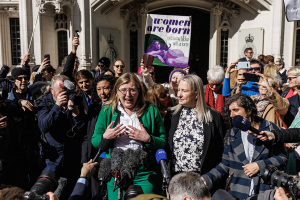Reverse Missions to the 'Dark Continent' (Part 1)
"This is such a dark place."
The irony stopped me in my tracks. The speaker was Jonas Kouassi-Zessia, an African émigré to Europe who had planted a church there.
In the 19th and 20th centuries Europe – and America – was sending missionaries to Africa. Europeans and Americans referred to Africa as the "Dark Continent." Now, in the eyes of an African Christian leader, it was Europe shrouded in darkness.
I recently spent two weeks with Pastor Kouassi-Zessia in Copenhagen, and with his counterparts in Paris. I was there to conduct "Globequake" conferences, focusing on helping churches stay steady and minister effectively in an environment of intense change.
I discovered people who are on the leading edge of "reverse missions" in Europe. Missionaries had once gone to their home nations, but now the Africans, many of them the second or third generation fruit of Western missions, are immigrating to Europe. They work in many vocations, but at the core they see themselves as envoys of God's Kingdom in the new "Dark Continent."
In contrast to the missions model of the 19th and 20th centuries, these "missionaries" have no sending agency that helps them with support. They are anchored to strong churches in Africa, but they come to Europe to get jobs. In the process they become examples of "as you go" evangelism and discipleship.
Jesus said in Matthew 28:19 that His followers are to "go into all the world" making disciples –apprentices of Jesus and His Kingdom – and baptizing them in an open declaration of their identification with Christ. Some interpreters see the command to "go" as referring to the pursuit of vocation and lifestyle, and doing the work of the Kingdom as Christ's followers go about those pursuits.
Jonas Kouassi-Zessia is a prime example of this style. He first entered Europe almost two decades ago as a member of the diplomatic corps of Ivory Coast, his West Africa home country. Kouassi-Zessia had diplomatic postings in Cairo and Ottawa before his Danish assignment. As an economist, Kouassi-Zessia had helped manage embassy finances and conduct business relating to his country's rich exports of cocoa, exotic wood for making furniture, and other products.
But Jonas Kouassi-Zessia and people like him are genuine "lifestyle evangelists." He came to Europe anchored to an intensely visionary church in Ivory Coast, the 185,000-member Protestant Baptist Works and Mission Church. Kouassi-Zessia had been taught by his pastor, Dion Robert, to plant the church wherever he landed.
So, in Copenhagen, Kouassi-Zessia seeded a church. Then he sowed congregations in other parts of Denmark, and in Sweden. Ultimately, his work as an ambassador of the Kingdom of God overwhelmed his work as a diplomat for the government of his native country. To the consternation of some of those closest to him, 15 years ago Kouassi-Zessia resigned his embassy post, sacrificing his retirement and diplomatic perks, and became a fulltime pastor.
"I had to take care of God's flock in this place," he told me.
In an earlier life, Jonas Kouassi-Zessia would have been an unlikely choice to be an ambassador of the Kingdom of Light. He was born in a remote village in Ivory Coast, far from schools and other institutions. At age 13, he had to arrange his own transportation to a town 200 kilometers (124 miles) away to continue his education. Once there, the teenager had to knock on doors until he found a home that would provide him shelter in return for menial chores.
During his college years Kouassi-Zessia joined an occult movement with tentacles throughout the world. He spent 18 years with the group, going deeper and deeper into its layers of demonic engagement. He learned secrets and saw things that would shatter human reason. Finally he realized that to go deeper into the teachings of the occultic order would take him to the threshold of Hell itself. Kouassi-Zessia turned, and made a serious commitment of his life to Christ.
In many ways, Jonas Kouassi-Zessia is a prototype of the "reverse missionaries." They are not in Europe as revolutionaries, bent on bringing down governments, or committing acts of terrorism and mayhem. Kouassi-Zessia and his counterparts throughout Europe see their mission as continuing the incarnational work of Jesus Christ in the nations to which they are sent.
Like the African Anglican bishops who are holding the line on biblical authority amidst the trendy frolics of the Church of England and the American Episcopal Church, Kouassi-Zessia and his partners are relentless in their adherence to biblical purity in belief and practice. But they are also in Europe as servants of Christ and the populations around them, in the style of Jesus.
As we will see in the next article in this series, their methodology is based on the strategy of the early church as it penetrated the Roman Empire. This approach is proving effective now as 2,000 years ago, since the paganism of ancient Rome is once again sweeping Europe.





























